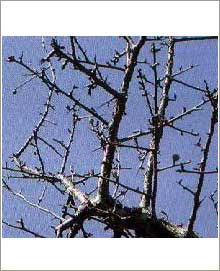 WASHINGTON (Reuters) -- A traditional remedy used for 2,500 years in Indian ayurvedic medicine works to lower cholesterol, and in a new way that might lead to the development of improved drugs, researchers said on Thursday.
WASHINGTON (Reuters) -- A traditional remedy used for 2,500 years in Indian ayurvedic medicine works to lower cholesterol, and in a new way that might lead to the development of improved drugs, researchers said on Thursday.The resin of guggul, or the myrrh shrub, is used in India to battle obesity, arthritis and artery disease, and is now approved for lowering cholesterol.
David Moore of the Baylor College of Medicine in Houston found the guggul extract lived up to its reputation.
"It really does lower cholesterol in a number of clinical studies in the Indian literature," Moore said.
But the one study that has been done in the United States showed the remedy in fact raised cholesterol slightly, and Moore said it could interact with other drugs.
Writing in the journal Science, he said the thorny myrrh tree has been used in Indian Ayurvedic medicine since at least 600 BC to treat obesity and other disorders.
Moore's team found the steroid guggulsterone, the active agent in the Guggul extract, blocks the activity of the farnesoid X receptor (FXR) on cells.
FXR helps regulate cholesterol by affecting bile acids, which are produced from cholesterol and released by the liver.
"Bile acids are the only way that cholesterol has to get out of the body," Moore said in a telephone interview. "We knew that FXR was a key regulator of cholesterol metabolism."
Blocking FXR
Moore wanted to study FXR more, so he looked for compounds known to lower cholesterol whose mechanism of action was not understood.
"I spent quite a lot of time clicking around the Internet," he said. He found guggul, along with niacin -- often prescribed for cholesterol patients -- and red wine, among others.
Red wine and niacin were not involved enough with FXR to interest him, but gugulipid, available in health food stores in the United States, was.
Tests in mice showed guggul extract lowers cholesterol by blocking the effects of FXR. "We put mice on a high cholesterol diet for a week and measured cholesterol levels in the liver," said Moore, who worked with colleagues at the University of Texas Southwestern Medical Center in Dallas.
"In normal mice you feed them cholesterol and the cholesterol level in the liver goes up, but if you feed them cholesterol and give them guggulsterone at the same time, the cholesterol levels stay the same," he said.
Mice bred to lack FXR did not respond to guggul.
Moore, who with colleagues has set up a small biotechnology company called X-Ceptor Therapeutics, Inc. in San Diego, California, said it might be possible to more specifically target FXR with a drug. The company has patented FXR.
"As a pharmaceutical company you are not going to be interested in producing something that is already available, but you going to be interested in producing something that is better," Moore said.
Moore, who takes statin drugs to lower his own cholesterol, tried guggul. "It dropped my total serum cholesterol by 10 percent," he said.
"But we had some evidence that it might have effects on the activity of other drugs and I stopped taking it."
Weight reducer
Guggul extract is being marketed in some countries as a weight reducer
Other claims for guggulipid are that it can help you lose weight by increasing metabolism. "I was disappointed there," said Moore, "It did not affect my weight."
Dr. Philippe Szapary, a University of Pennsylvania professor of medicine who did the only U.S. study on guggulsterone, said he was surprised to find it actually raised cholesterol in the two-thirds of 103 patients who took it.
"There is no doubt that it is active and has some effects on lipid metabolism," he said in a telephone interview.
"But these things are very complex. Things look exciting at first and when you apply them to large groups you find something different."
He said diet or genetics would affect how guggul acts on a person's metabolism.
Guggul is not the first "natural" remedy found to lower cholesterol. In 1998 the U.S. Food and Drug Administration banned cholestin, made from fermented red rice and used in traditional Chinese medicine, saying it contained the prescription drug lovastatin.
But a federal judge reversed the ruling in 1999.




No comments:
Post a Comment